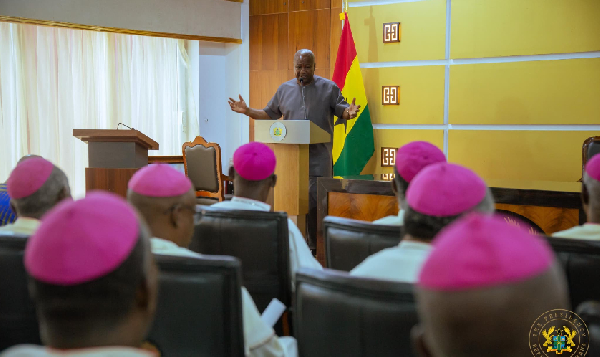The Ghana Catholic Bishops’ Conference (GCBC) has advocated reconstituting the Electoral Commission’s (EC) appointment frameworks to ensure its independence.
Reverend Matthew Gyamfi, the GCBC’s President and Bishop of the Sunyani Diocese, made the appeal during a courtesy call on President John Dramani Mahama at the Presidency in Accra.
The bishops visited the Presidency to congratulate the President on his landslide victory in the December 7, 2024, general election and to present a range of issues of national concern for his attention, including the menace of illegal mining, educational reform, governance, and electoral reforms.
Rev. Gyamfi also called for reforms in electoral security deployment protocols, the creation of an independent commission for democratic integrity with prosecutorial powers, and the institutionalization of a civil service charter to protect public servants.
He recommended the establishment of a biennial inter-party forum led by faith-based and traditional authorities.
He informed the President that members of the Ghana Catholic Bishops’ Conference had just returned from a meeting in Darka, Senegal, where all the Catholic Bishops of West Africa, including those from the ECOWAS region (Mali, Guinea, Senegal, and Burkina Faso), were present.
He noted that they had passionate discussions on the developments in the sub-region, sharing views from the ground with all the bishops.
This, he said, compelled them to address the growing sense of disillusionment among the people in the sub-region and even in their own country.
Rev. Gyamfi reiterated that trust in democratic institutions was waning, and electoral participation, while still robust by global standards, had declined from 85 percent in 2016 to 60.9 percent in 2024.
He said this downturn in electoral participation underscores a growing sense of disengagement among the electorate, particularly and alarmingly among the youth.
He noted that the reduced turnout reflects broader concerns about the efficacy of democratic processes in addressing pressing national issues, adding that, more worryingly, many young Ghanaians now express disaffection with politics as a vehicle for real change.
He said the perception that politics is transactional and exclusive must be confronted.
“We must make democracy work, not just periodically at the polls, but persistently through policy, equity, and inclusion,” he said.
He added, “Mr. President, we have national unity challenges. Political polarization has intensified, deepening mistrust along ethnic, regional, and partisan lines. Land disputes, chieftaincy conflicts, and vigilantism persist in flashpoint areas. Electoral violence persists in our democracy.”
Rev. Gyamfi said that, although Ghana had successfully conducted nine elections between 1992 and 2024 and peacefully transferred power on four occasions in the Fourth Republic, electoral violence has been an enduring feature across all general elections and most by-elections in the country.
Rev. Gyamfi cited a CDD Ghana report indicating that during the 2024 election, there were 76 incidents: 24 cases of destruction, seizure, vandalism, and invasion of public facilities, and 46 injuries with six deaths.
He also noted allegations of partisan dismissals and political vindictiveness across successive regimes over the past 32 years.
The bishops appealed to President Mahama to leverage the massive support Ghanaians have given him, along with the ruling National Democratic Congress’ (NDC) control of Parliament, to rationalize Article 71 payments and link public service remuneration to national equity.
He urged the government to prioritize labor-absorbing infrastructure projects, expand and depoliticize the Livelihood Empowerment Against Poverty (LEAP) program, strengthen the National Health Insurance Scheme (NHIS), and pass campaign funding regulations with independent audits.
He said that, reflecting on these developments, it becomes imperative for both church and state to collaborate more closely in fostering civic education and engagement.
He added that by reinforcing the values of participatory governance and accountability, they could work toward revitalizing public trust and ensuring that democracy serves the prosperity of all Ghanaians.
“As shepherds of souls, we do not seek to govern, but we are called to guide, to remind, and to raise our voice when the nation’s conscience trembles,” Rev. Gyamfi said.
He concluded, “Mr. President, let us build a politics that serves not itself, but the people. A politics that is not about the survival of the fittest, but about the flourishing of the weakest. A politics where governance is not only performance, but a moral vocation.”


